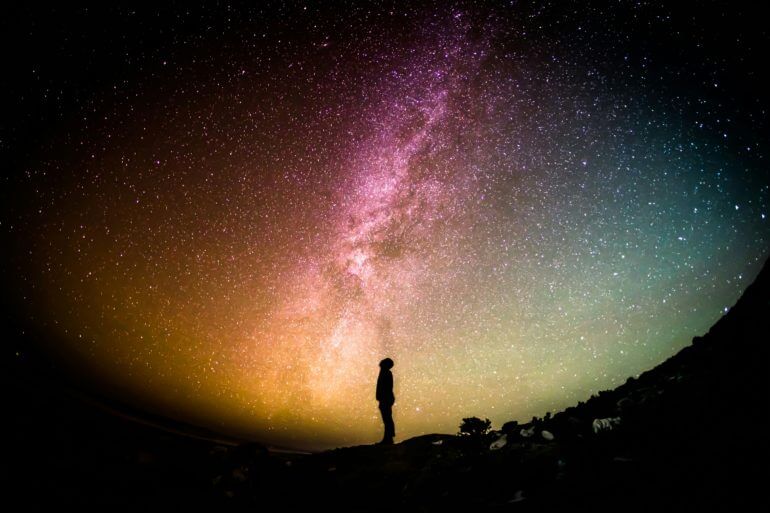
Have We Forgotten the Spiritual Part of Judaism? : Remembering What It’s Really All About
“We refute our Jewishness,” said Jonathan Glazer in the beginning of his controversial Oscar award winning speech. But does he, or for that matter, we, even really know what “our Jewishness” is about?
Jewish customs seem like they can range from being deep and meaningful like reading the hagadah to startlingly unintelligible like getting drunk on Purim. The question is, do you feel spiritually connected doing either?
Anyone can appreciate lighting a shiny menorah, eating delicious matza ball soup, and hearing the penetrating sound of the shofar. But when you think about spirituality, does your mind go to yarmulkes or orange robes?
Have we found ourselves so deeply involved with the trees of external Judaism that we’ve missed the forest of God and spirituality?
Taking a look at Watkins Top 100 spiritual teachers of the world, you’ll quickly notice many Jewish names, but no Torah. You’ll find new age spirituality, Christian mysticism, Hinduism, Buddhism, and modern psychology, but no Torah representation. Is that because the Torah isn’t a spiritual teaching or is that because we’ve lost touch with its spiritual roots? To me, this feels like a ‘Houston, we have a problem’ moment. We are in desperate need of a spiritual renaissance of Torah living. At least I was.
Nearly a decade ago after years of Torah study and dedication I somehow felt a sort of spiritual distance. I realized that you could “keep all the rules” and still miss the mark, spiritually speaking. There can be a great difference between religion and spirituality.
The word religion itself has Latin roots in the word religare which means to bind or relegate. Spirituality on the other hand roots from the word spiritus or spiritualitas which means to breathe. Religion involves adherence to specific rules and constraints, whereas spirituality emphasizes freedom, openness, and the essence of breathing freely.
The only problem with this assessment is that religion is intended to be spiritual. In other words, a path to bind yourself to the breath, to remain in alignment with this higher space and freedom.
I am not the first person to feel this lack of harmony. The Chasidic movement began as a form of spiritual enlightenment with the expressed intention of putting the pieces back together.
There is a kabalistic idea that says, “The 613 mitzvot are in fact 613 pieces of advice on how to connect to God.” This God consciousness and enlightened life sits at the center of what Torah is about.
So why doesn’t it feel that way?
Eckhart Tolle, one of the world’s leading spiritual teachers, makes the following three poignant observations about spiritual teachings of religion in his book A New Earth:
“The world was not ready for them, and yet they were a vital and necessary part of human awakening. Inevitably, they were mostly misunderstood by their contemporaries, as well as by subsequent generations…”
- Even if spiritual ideas are embedded within religion, if they are misunderstood they don’t translate into our everyday experience.
“Throughout history, there have always been rare individuals who experienced a shift in consciousness and so realized within themselves that toward which all religions point…”
- Nevertheless, individuals who themselves have tasted spiritual enlightenment have always been able to see the spiritual truths that exist within the conceptual framework and structure of religion.
“Over time, some of those schools themselves became too rigidly formalized or conceptualized to remain effective.”
- Over time, the religious experience transitions into a more orthopraxic form, where the emphasis shifts from the internal, spiritual quest to the external observance of rituals, traditions, and community norms. In such a system, adherence to prescribed behaviors, ceremonies, and cultural customs takes precedence over the personal, inner journey towards spiritual enlightenment or connection. This phenomenon can be described as ritualism or ceremonialism, where the symbolic aspects of religion or spirituality become ends in themselves rather than means to achieve deeper spiritual understanding or transformation.
Enclothed in mystical and allegorical language, two millennia of a formally organized cultural approach to Judaism, and when you put this in context of a 2000-year exile where Jews were persecuted, tortured, and murdered, we might come to the following conclusion:
We have been so intensely preoccupied with staying alive that we collectively chose to preserve the foundational structure, harboring the hope that one day we might have enough freedom to pursue its profound depths.
Maybe that day is today. Have we arrived at an era where there is enough freedom to reconnect with the spiritual underpinnings that the Torah begs us to reveal?
Here are just a few underlying assumptions the Torah offers:
- We are each a light, an extension of God in the world, with a divine purpose to elevate humanity.
- In light of the above, you have inherent value and goodness that can never be questioned but has the opportunity to be revealed.
- Life is not random, it unfolds with purpose and intention, and always working out for a higher Good.
- Your personal need for things to be different than how they are (your ego) is what causes you mental and emotional suffering and keeps you separate from feeling spiritually connected.
- God is always present, here and now. That includes wherever and whenever you are as you read this.
“Jewishness” might be something worth exploring more deeply, as within the heart of Torah lie these and countless other spiritual truths. It’s time to awaken to its ultimate purpose. If religion is what you do, spirituality is how you do it. When we collectively wake up to this fact, we might find ourselves inspired to look deeper, find our true selves, and the deeper purpose to our lives.
If you found this content meaningful and want to help further our mission through our Keter, Makom, and Tikun branches, please consider becoming a Change Maker today.






